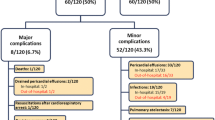Abstract
Post-pericardiotomy syndrome (PPS) is an inflammatory process involving the pleura, pericardium, or both and occurs after cardiothoracic surgery. Surgical atrial septal defect (ASD) closure is associated with higher incidence of PPS post-operatively as compared to other operations. Reported incidence of PPS varies from 1 to 40%. NSAIDs are often used to treat PPS and in our center, some practitioners have prescribed ibuprofen prophylactically. This study sought to investigate the impact of prophylactic treatment with ibuprofen on the development and severity of PPS following surgical ASD closure, with particular attention to secundum-type ASDs. We retrospectively reviewed clinical and operative data of all surgical ASD repairs in our center from 1/2007 to 7/2017. ASDs were grouped by subtype. PPS was considered positive if the primary cardiologist diagnosed and documented clinical signs of PPS on post-operative outpatient follow-up. Records were reviewed to confirm documented diagnosis of PPS. A total of 245 cases were reviewed with 207 having sufficient data. Median age was 2 years (range 4 months–27 years), female 57%. Overall incidence of PPS was 10%. There was no difference in incidence of PPS in those prescribed ibuprofen as compared to those who were not. This was true for both the entire cohort and the subgroup analysis (P = 1.0). Four patients overall required pericardiocentesis, none of whom received prophylactic ibuprofen. Prophylactic ibuprofen prescription following surgical ASD repair did not reduce the rate of PPS in our cohort.
Similar content being viewed by others
Abbreviations
- PPS:
-
Post-pericardiotomy syndrome
- ASD:
-
Atrial septal defect
- CHD:
-
Congenital heart disease
- NSAIDs:
-
Non-steroidal anti-inflammatory drugs
- SV:
-
Sinus venosus
- CS:
-
Coronary sinus
References
Hoffman JI, Kaplan S (2002) The incidence of congenital heart disease. J Am Coll Cardiol 39(12):1890–1900
Campbell M (1970) Natural history of atrial septal defect. Br Heart J 32(6):820–826
Clapp SK, Garson A Jr, Gutgesell HP, Cooley DA, McNamara DG (1980) Postoperative pericardial effusion and its relation to postpericardiotomy syndrome. Pediatrics 66(4):585–588
Heching HJ, Bacha EA, Liberman L (2015) Post-pericardiotomy syndrome in pediatric patients following surgical closure of secundum atrial septal defects: incidence and risk factors. Pediatr Cardiol 36(3):498–502
Gouriet F, Levy PY, Casalta JP et al (2015) Etiology of pericarditis in a prospective cohort of 1162 cases. Am J Med 128(7):784-e1
Weitzman LB, Tinker WP, Kronzon I, Cohen ML, Glassman E, Spencer FC (1984) The incidence and natural history of pericardial effusion after cardiac surgery—an echocardiographic study. Circulation 69(3):506–511
Adler Y, Charron P, Imazio M et al (2015) 2015 ESC guidelines for the diagnosis and management of pericardial diseases: the task force for the diagnosis and management of pericardial diseases of the European Society of Cardiology (ESC) endorsed by: the European Association for Cardio-Thoracic Surgery (EACTS). Eur Heart J 36(42):2921–2964
Horneffer PJ, Miller RH, Pearson TA, Rykiel MF, Reitz BA, Gardner TJ (1990) The effective treatment of postpericardiotomy syndrome after cardiac operations. A randomized placebo-controlled trial. J Thorac Cardiovasc Surg 100(2):292–296
Beland MJ, Paquet M, Gibbons JE, Tchervenkov CI, Dobell AR (1990) Pericardial effusion after cardiac surgery in children and effects of aspirin for prevention. Am J Cardiol 65(18):1238–1241
Gill PJ, Forbes K, Coe JY (2009) The effect of short-term prophylactic acetylsalicylic acid on the incidence of postpericardiotomy syndrome after surgical closure of atrial septal defects. Pediatr Cardiol 30(8):1061–1067
Cantinotti M, Spadoni I, Assanta N et al (2014) Controversies in the prophylaxis and treatment of postsurgical pericardial syndromes: a critical review with a special emphasis on paediatric age. J Cardiovasc Med 15(12):847–854
Imazio M, Brucato A, Markel G et al (2011) Meta-analysis of randomized trials focusing on prevention of the postpericardiotomy syndrome. Am J Cardiol 108(4):575–579
Imazio M, Brucato A, Ferrazzi P et al (2014) Colchicine for prevention of postpericardiotomy syndrome and postoperative atrial fibrillation: the COPPS-2 randomized clinical trial. JAMA 312(10):1016–1023
Dressler W (1956) A post-myocardial infarction syndrome; preliminary report of a complication resembling idiopathic, recurrent, benign pericarditis. J Am Med Assoc 160(16):1379–1383
Imazio M, Hoit BD (2013) Post-cardiac injury syndromes. An emerging cause of pericardial diseases. Int J Cardiol 168(2):648–652
Khan AH (1992) The postcardiac injury syndromes. Clin Cardiol 15(2):67–72
Jones DA, Radford DJ, Pohlner PG (2001) Outcome following surgical closure of secundum atrial septal defect. J Paediatr Child Health 37(3):274–277
Cabalka AK, Rosenblatt HM, Towbin JA et al (1995) Postpericardiotomy syndrome in pediatric heart transplant recipients. Immunologic characteristics. Tex Heart Inst J 22(2):170–176
Author information
Authors and Affiliations
Corresponding author
Ethics declarations
Conflict of interest
All authors declare that they have no conflicts of interest relevant to this article to disclose.
Research Involving Human and Animal Participants
This article does not contain any studies with human participants or animals performed by any of the authors.
Informed Consent
A waiver of informed consent was obtained from the Northwell Health institutional review board.
Rights and permissions
About this article
Cite this article
Rabinowitz, E.J., Meyer, D.B., Kholwadwala, P. et al. Does Prophylactic Ibuprofen After Surgical Atrial Septal Defect Repair Decrease the Rate of Post-Pericardiotomy Syndrome?. Pediatr Cardiol 39, 1535–1539 (2018). https://doi.org/10.1007/s00246-018-1926-4
Received:
Accepted:
Published:
Issue Date:
DOI: https://doi.org/10.1007/s00246-018-1926-4




